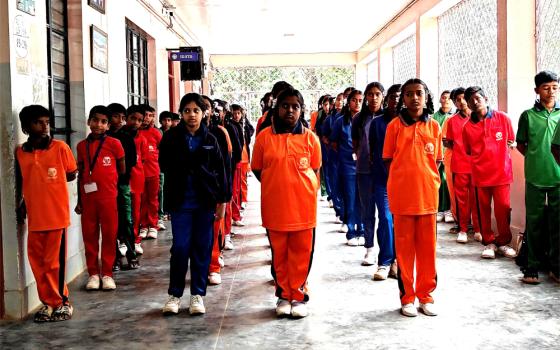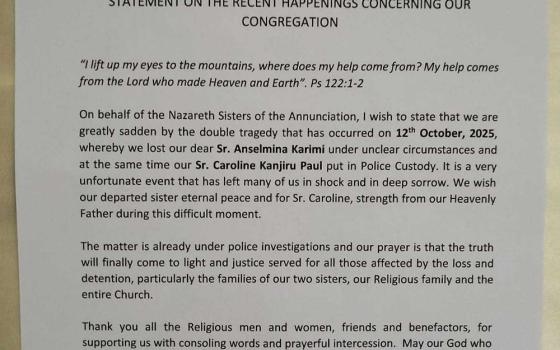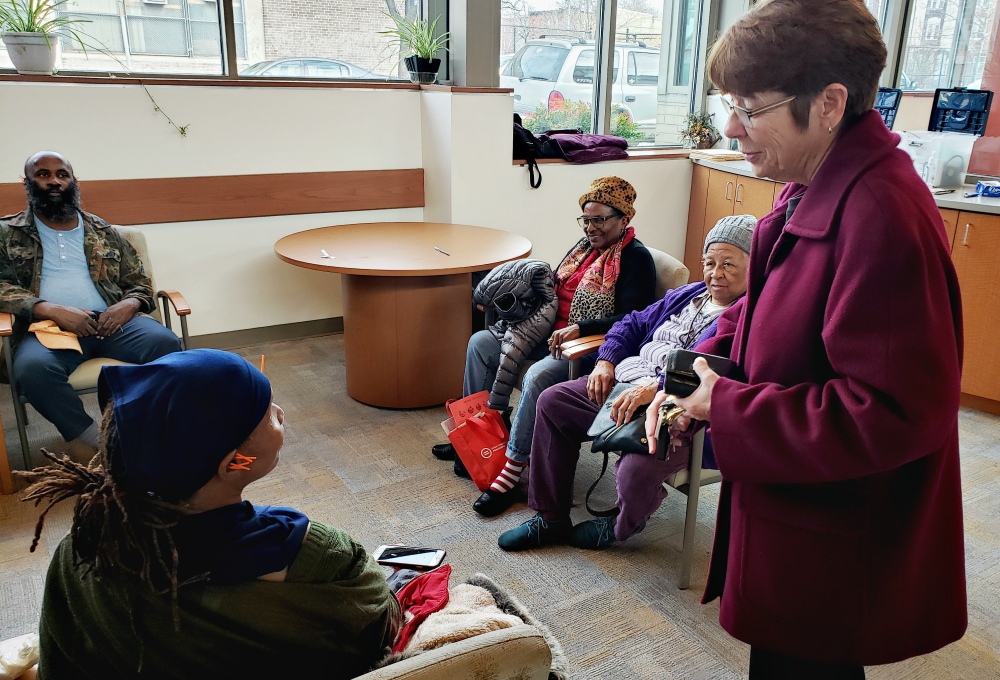
Mercy Sr. Mary Scullion, one of the co-founders of Project HOME in Philadelphia, meets clients at a Project HOME medical facility in December. (GSR photo/Chris Herlinger)
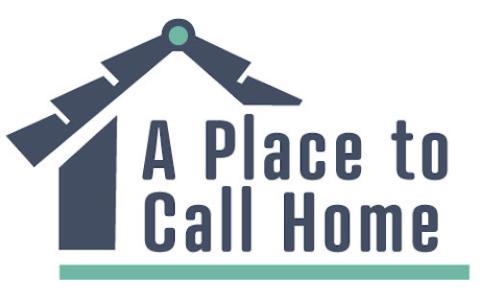
(GSR/Toni-Ann Ortiz)
Editor's note: More than 1.6 billion people worldwide live in substandard housing. Of those, at least 150 million have no home at all. In this special series, A Place to Call Home, Global Sisters Report is focusing on women religious helping people who are homeless or lack adequate shelter. The series examines how homelessness and a lack of affordable housing affect teens and young adults, families, migrants, the elderly and those displaced by natural disasters and climate change in stories from Kenya, India, Vietnam, Ireland, Puerto Rico, the Philippines, the United States and elsewhere.
On a recent late summer afternoon, Mercy Sr. Mary Scullion found herself, as she has so often in the last six months, at home and working on Zoom.
Wearing a green Irish-themed Philadelphia Phillies T-shirt, the nationally recognized advocate for those who are homeless expressed frustration with pandemic-driven realities, rules and challenges that seem almost normal now but would have been unthinkable six months ago.
"It's been a very, very stressful, challenging, creative time," said Scullion, who heads Philadelphia's Project HOME, one of the most prominent anti-homelessness organizations in the United States. "It's just very hard to describe. There's just been a sea of changes in so many ways."
The pandemic has brought many challenges, but her colleagues and advocates in the trenches on the issue of homelessness say Scullion is indefatigable and has the political savvy to turn a setback into a win.
Certainly, the results speak for themselves: What began as a city emergency shelter more than 30 years ago has grown into a respected organization in Philadelphia that operates 900 housing units and runs job and educational projects as well as a neighborhood wellness and health center.
The integration of programs pays off. When Scullion was named one of Time magazine's 100 most influential people in 2009, the publication noted, "More than 95% of those who cycle through [Project HOME] ... have never again returned to life on the streets — a success rate that has made the program a model for dozens of other U.S. cities."
Even with the recognition and success, friends and allies of Scullion say that little about her has changed through the years.
"The passion and commitment are all there, and they were there at the beginning," said Eva Gladstein, the deputy managing director for Health and Human Services for the City of Philadelphia. Gladstein has known Scullion since the 1980s, when both worked as housing advocates.
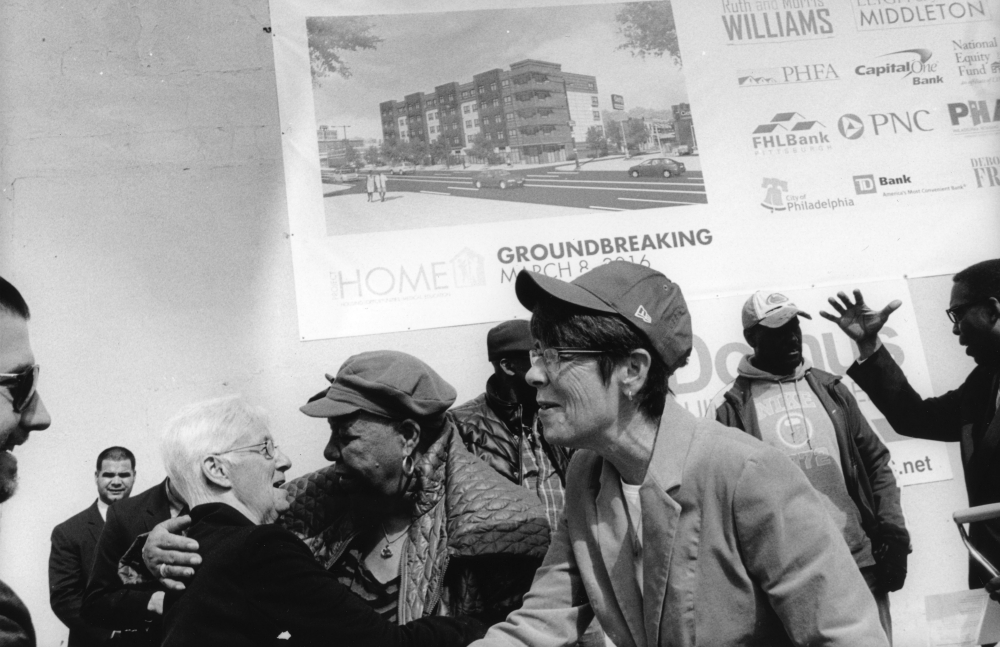
Mercy Sr. Mary Scullion celebrates the March 2016 groundbreaking for a new Project HOME apartment building on North Broad Street in Philadelphia (Courtesy of Project HOME/Harvey Finkle)
That passion, Gladstein said in a recent interview with Global Sisters Report, is now supplemented by years of experience and the ability to adapt to different circumstances.
Scullion made it clear in a Zoom interview with GSR that while there may be opportunities now to explore new ways of doing things, the COVID-19 pandemic is worsening an already-difficult situation in Philadelphia.
Philadelphia has witnessed a 10% annual rise in housing costs in recent years, making housing less affordable to those with lower incomes, Scullion said. Luckily, in the wake of the pandemic, the city's housing authority has extended an eviction moratorium until March 2021. But the overall pandemic situation remains troubling, Scullion said.
"We're seeing the devastation of homelessness coupled now with COVID," Scullion said. "That complicates homelessness and COVID to some extent in very serious ways, because obviously when people are told to stay at home but they don't have a home to go to, that makes social distancing, hygiene, hand-washing, all those things much more difficult for people."
And that points to even more troubling realities.
"In the Project HOME community, we've always understood that homelessness is the canary in the mine. It's the prophetic call to all of us that there's something radically wrong in our society if anybody is living on our streets."
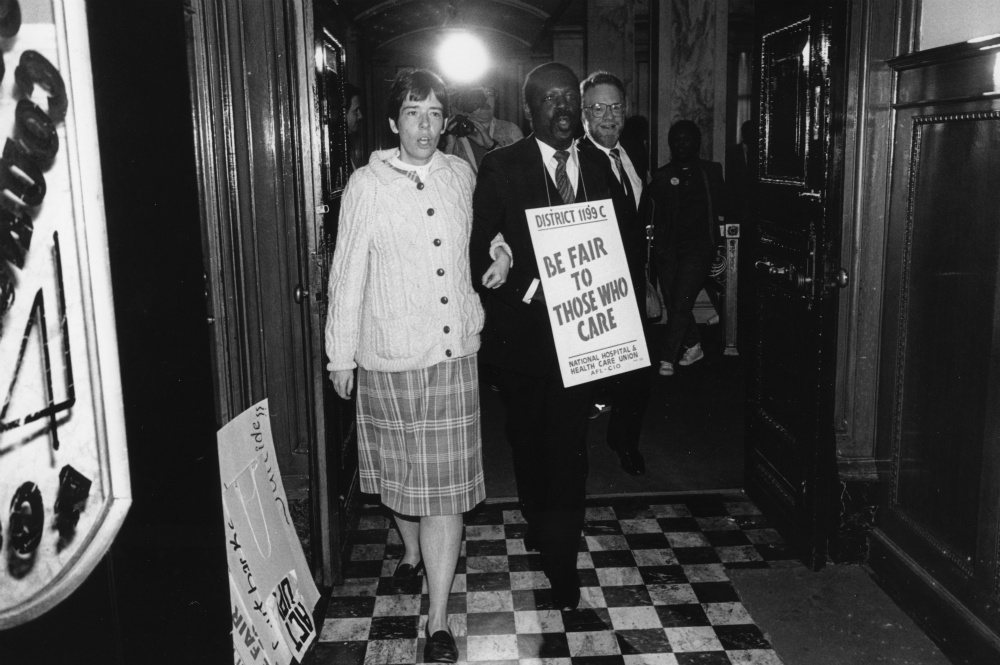
From left: Mercy Sr. Mary Scullion, Henry Nicholas and Bob Brand at a 1989 demonstration on homeless issues at Philadelphia City Council (Courtesy of Project HOME/Harvey Finkle)
'None of us are home until all of us are home'
In two days of following Scullion in her rounds of December meetings with organizational partners, staff and board members and in her encounters with Project HOME clients, Scullion's passion, warmth and love of people proved to be the perfect antidote to the seemingly cold and affluent office buildings, high-end hotels and condominiums in downtown Philadelphia — or Center City, as residents call it — that can seem hostile to the needs of those who seek a respite or solution to life without a home.
Tuesdays start off with a half-hour informal staff gathering, a time for staff and volunteers to come together and reflect on the past week, look ahead to the next and affirm the tenets of the organization, which was founded in 1989 by Scullion and Joan Dawson McConnon, who is Project HOME's associate executive director and chief financial officer.
The staff members recite in unison the organization's vision statement — "None of us are home until all of us are home" — and Scullion, one of several staffers who spoke at this particular December meeting, affirmed the need to draw on "acts of kindness."
"Today, in the world we're living in, it's so important to find the things that do feed our souls," she said.
Scullion and her colleagues do that by creating and nurturing an inviting work environment. After seven years, every Project HOME employee is entitled to a one-month paid sabbatical, a policy Scullion said is borne from the demands of often-difficult jobs.
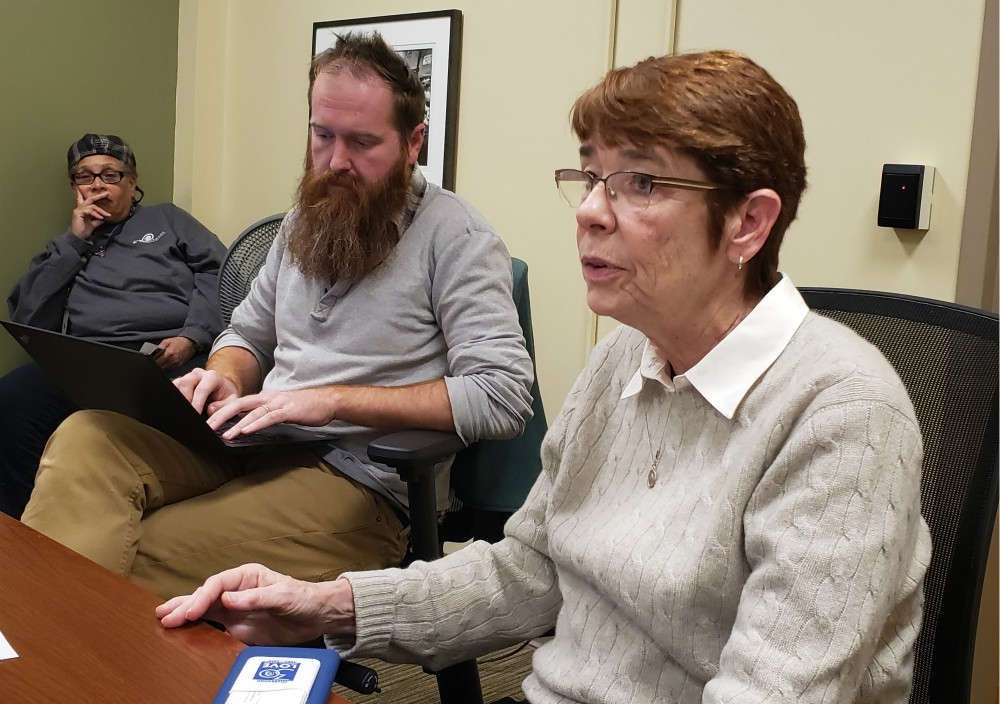
Mercy Sr. Mary Scullion, right, at a December 2019 meeting of Project HOME staff in Philadelphia (GSR photo/Chris Herlinger)
"This is hard work, and it's good for people to recharge," Scullion said while briskly walking to an appreciation breakfast at a local diner for staff members with December birthdays.
Project Home's roots were rather humble, said Edel Howlin, spokesperson for Project HOME. It started as a winter shelter, but Scullion and McConnon soon realized that the end of winter did not mean needs ended.
"They thought they couldn't just send folks away after building relationships with them throughout the winter. It was there that the idea of figuring out how to offer housing, opportunity for employment, medical care and education was born," Howlin wrote in an email to GSR. "The thinking [was] that if you can provide all of these things to a person, they need never be homeless again."
Philanthropists took notice, including the family of John Middleton, principal owner of the Philadelphia Phillies baseball team, "who wanted to combine their resources with other philanthropists to really do some positive work for change in Philly and it has made a difference. We have opened a new building nearly every year for the last six years," she wrote.
Philadelphia has one of the highest rates of poverty of any large U.S. city, the Pew Charitable Trusts said in a 2019 report. But because of the work of Project HOME and other groups, Philadelphia has a low rate of those experiencing street homelessness.
A 2019 assessment of Project HOME's three decades of work noted:
Philadelphia has made substantial progress. Our street counts, though hovering above 900 people in recent years, are the lowest of the nation's ten largest cities, despite a staggeringly high poverty rate (26 percent, or approximately 400,000 Philadelphians). By comparison, Los Angeles, with three times Philadelphia's population, has a poverty rate of 18.6 percent and a homeless population of 22,887. Leadership and partnership from people, organizations, and government agencies across the region and country have played a critical role in creating a future of hope for so many.
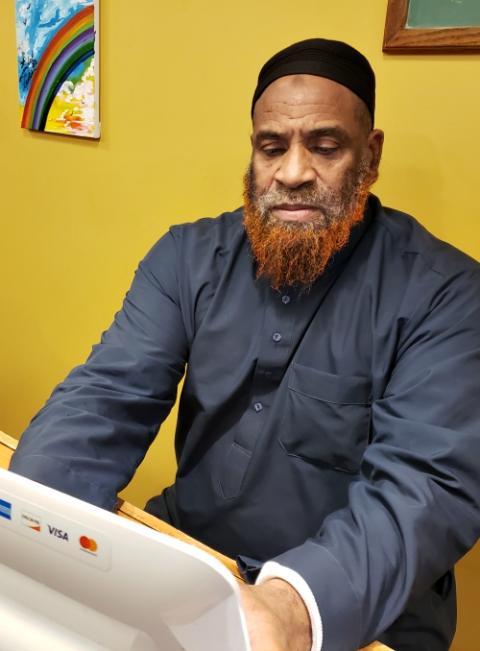
David Brown helps manage a used-clothing boutique store in Philadelphia run by Project HOME and rents and apartment in a building the agency built. (GSR file photo)
David Brown, who was once homeless and now helps manage a used-clothing boutique store run by Project HOME, rents an apartment in a building the agency built. He said the affirmation he has received from Scullion and Project HOME is a recognition of simple dignity and humanity.
"It feels good to pay rent, to pay taxes," he said, adding that Project HOME recognizes that those living as homeless are not and should not be rendered invisible.
"You can't hide the homeless," he said. "They're in the community already."
Project HOME is part of a larger movement, what Scullion calls a broad effort nationally and globally to deal with poverty, the root cause of homelessness.
"With homelessness, there are a lot of adverse factors," Scullion said. Unaffordable health care, institutional racism and endemic poverty all contribute to a cycle that groups like Project HOME are trying to break, she said.
It is all of a piece, Scullion said.
"What we say at Project HOME is HOME: H, affordable housing; O, opportunities for employment; M, medical care; and E, education. The single most important thing to ending homelessness today is affordable housing. The simple most important thing to ending homelessness for the future is a quality education for every single child," she said.
Those were challenges before the pandemic. Now, Scullion argues that COVID-19 "has shown us how devastating not having a home can be, not only for the person experiencing homelessness, but for our whole community."
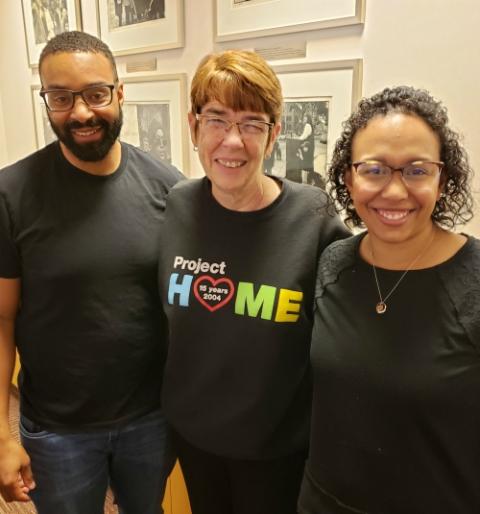
From left: Sylvester Mobley, the founder and executive director of Coded by Kids, a Philadelphia-based organization promoting and providing technology education for young people; Mercy Sr. Mary Scullion; and Melanie Hidalgo-Britt, Coded by Kids' revenue officer, in December. Project HOME and Coded by Kids are working to establish an education partnership. (GSR photo/Chris Herlinger)
Sylvester Mobley, the founder and executive director of Coded by Kids, a Philadelphia-based organization promoting and providing technology education for young people, has been working with Project HOME to establish an education partnership. He said Scullion and Project HOME are an important force in the city.
"She's always been someone I respected," he said.
Mobley said Scullion and Project HOME understand that the present focus on economic and social inequalities are part of a larger arc.
"The inequality isn't new. It's the same inequality we saw six months, six years ago," he said. Recent protests locally and nationally "are forcing people to acknowledge a situation they didn't want to acknowledge before."
Personal history rooted in Philadelphia
Scullion, 66, is a native Philadelphian, with a warm accent to prove it. Her parents, Sheila and Joseph Scullion, were both Irish immigrants, and neither had a high school education. In fact, neither graduated from eighth grade, she said.
The two met in Philadelphia, had two daughters and settled in an Irish-American enclave in the city's northeast area. Her mother was a waitress and her father a bartender and clerk for the Philadelphia City Council. Scullion's younger sister, Sheila Scullion, is a nurse who lives in St. Croix and at one point ran for governor of the U.S. Virgin Islands.
Church played an important part in the Scullion family life. But Scullion said her experience at Little Flower Catholic High School for Girls was pivotal because it exposed her to the work of the Sisters of Mercy.
She knew the sisters first as teachers, mainly in math, a subject she enjoyed and mastered. But the important embrace came in high school, when Scullion volunteered with the sisters at a Mercy-run summer camp, Camp Ozanam, for underprivileged children.
"I just really liked the work that the Sisters of Mercy did, and I thought, 'That's what I want to do,' " she said.
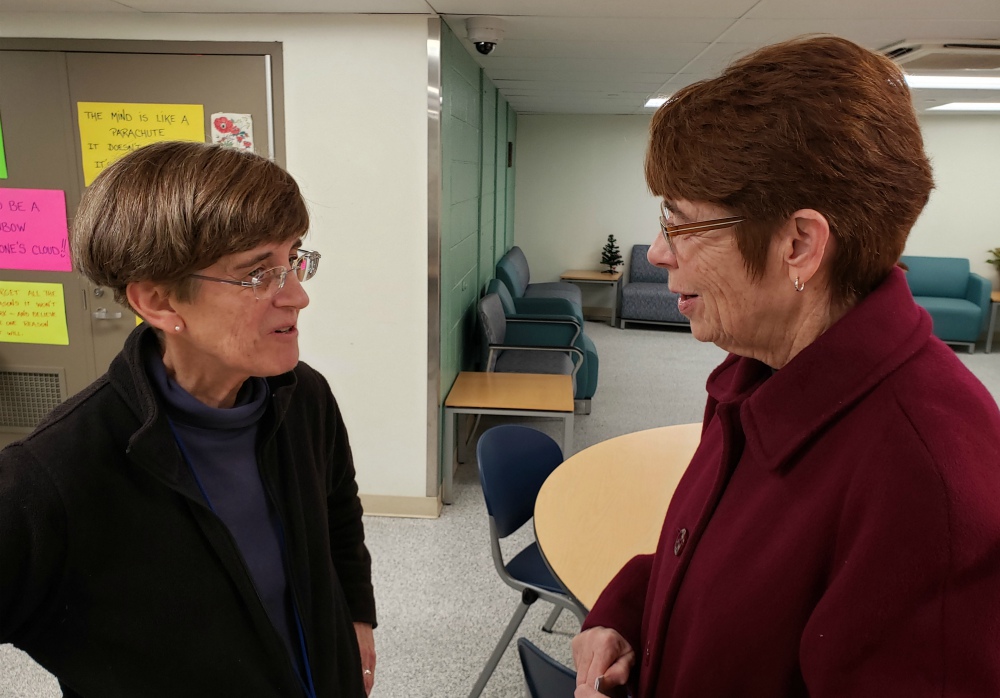
Mercy Sr. Mary Scullion, right, meets with fellow Mercy Sr. Eileen Sizer in December at the Hub of Hope, a safe space for those experiencing homelessness, in Suburban Station in downtown Philadelphia. The locale is part of a partnership between the city of Philadelphia, Project HOME and the Southeastern Pennsylvania Transportation Authority, or SEPTA. (GSR photo/Chris Herlinger)
Scullion applied to join the community as a high school senior and was told to wait a year. Her parents thought she should finish college and "have more life experience before I made the commitment," she said.
"My response was, 'This is really what I feel very passionately about. If I go in and it's not a good fit, I leave.' You know what I mean? Like, I get it out of my system. Let me. I felt very strongly about being a Sister of Mercy."
Scullion said the guiding influence of the Mercy charism, which affirms dignity, excellence, justice, service and stewardship, was "absolutely" a defining factor in wanting to become a member of the congregation.
"What I loved about the Sisters of Mercy was the work they did in the camp for underprivileged kids, for tutoring kids and helping their families in struggling neighborhoods. That's really what I wanted to do."
Scullion attended Temple University in Philadelphia for one year before earning a bachelor's degree in psychology from St. Joseph's University, a Jesuit university, and then a master's degree in social work from Temple University's School of Social Administration.
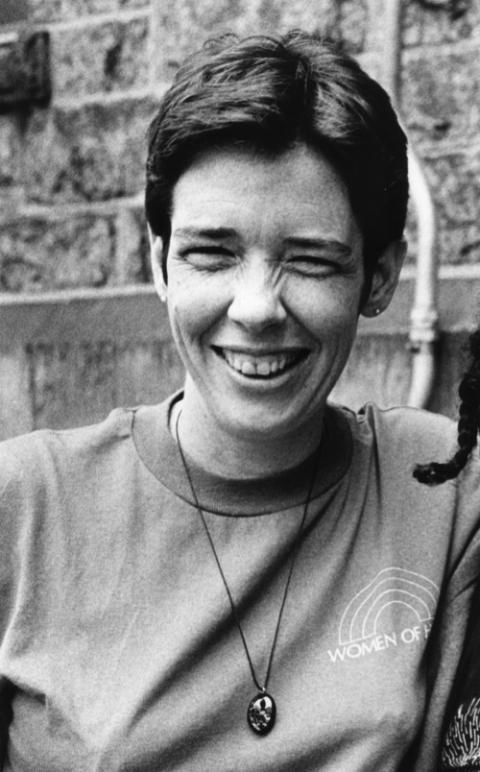
Mercy Sr. Mary Scullion in 1987 (Courtesy of Project HOME/Harvey Finkle)
She joined the Sisters of Mercy in 1972, when she was a student at St. Joseph's. She professed temporary vows in 1975, graduated from St. Joseph's in 1976, and made final vows in 1980.
The time at St. Joseph's University proved significant in unexpected ways. Fr. Ed Brady, a Jesuit priest at the school, asked students to volunteer at local soup kitchens. Hunger was a big issue on campuses in the early '70s — much more so than homelessness, Scullion said.
"There were federal policies in place that addressed affordable housing and made the resources available for affordable housing," she said. "The economic divide was not as large as it is today. There were many factors that played into most people [having] a place to call home."
As a student volunteer at St. John's Hospice in Philadelphia, a soup kitchen primarily for men, Scullion and other students started to notice that "at the end of a line, there were a few women. That was highly unusual."
Scullion and the sisters found space at St. Rita's, a local bingo hall, and set up 10 cots for the women.
"We'd sleep over and get breakfast," she said. "We just did that because they had no place to go."
That was the start of Scullion's homeless ministry. In 1976, the Mercy sisters established Mercy Hospice, a shelter for women, especially those with mental illnesses, under the auspices of the Philadelphia Archdiocese. In the 1980s, Scullion helped form several homeless Philadelphia ministries focused on the needs of those who are mentally ill or have special needs.
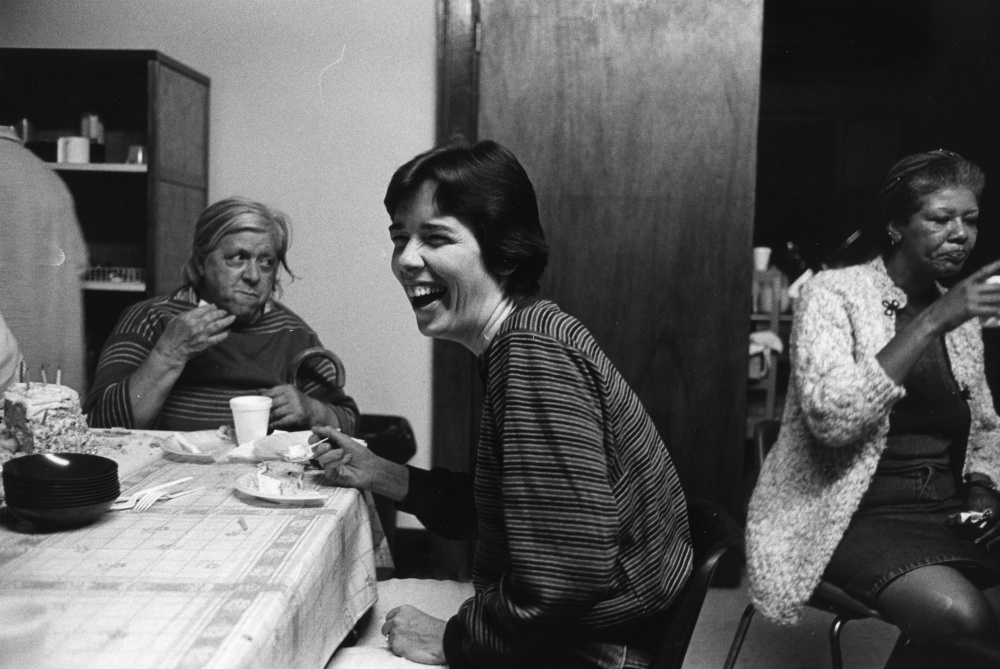
Mercy Sr. Mary Scullion eats cake in the late 1980s with women from Women of Hope, a Philadelphia organization that cares for homeless women with mental illness that Scullion started in 1985 (Courtesy of Project HOME/Harvey Finkle)
Though she now lives alone in a Project HOME residence, Scullion's ties to the congregation remain strong.
"Sister Mary is a woman of faith, action and energy," Sr. Patricia Vetrano, president of the Sisters of Mercy Mid-Atlantic Community, said in a statement to GSR, calling Scullion's ministry at Project HOME a "clear" reflection of the congregation's mission.
"Sister Mary is a woman of compassion, nurturing relationships among and beyond the Project HOME community. She has a powerful voice to speak truth to power and encourages others to join with her in working for a more just society."
Teachers from all walks of life
In 1976, the year Scullion graduated from college, Philadelphia hosted the 41st International Eucharistic Congress. Four of the most respected Catholics at the time attended and delivered remarks: Jesuit Fr. Pedro Arrupe, the superior general of the Society of Jesus; Mother Teresa, founder of the Missionaries of Charity; Dom Hélder Câmara, the Brazilian archbishop and leading proponent of liberation theology; and the American peace activist Dorothy Day.
Scullion recalls Arrupe saying, "If there is hunger anywhere in the world, the Eucharist is incomplete everywhere in the world."
It's no accident that Project HOME's motto echoes that statement. Those remarks "struck a deep chord in me," Scullion said.
So did the example of Day, who died shortly after the congress. Scullion, who met Day several times, said she is indebted to Day's commitment to "the spiritual and corporal works of mercy and a spirit of hospitality and making room for the person who crosses your path."
Scullion said Day was an example that "faith doesn't give us answers. It gives us courage."
Advertisement
Scullion also credits her other Project HOME colleagues, including McConnon, as teachers.
"Quite honestly, I think in addition to some of my key mentors, I would say that people who are experiencing homelessness were my greatest teachers," she said.
Scullion has earned other important allies and supporters in her ministry, including former President Bill Clinton and musician, humanitarian and New Jersey neighbor Jon Bon Jovi.
Scullion's friendship with Bon Jovi in particular is the stuff of Project HOME lore, Howlin said. A roadie for Bon Jovi came to Philadelphia in the winter of 2005, looking for organizations to support, and met Scullion.
"She and Jon later met and clicked right away," Howlin said.
In its 2009 blurb about Scullion, Time magazine noted Scullion's "ribald sense of humor" and reported that when Bon Jovi "described Mary to the press as a nun 'who swears and spits,' the good sister merely replied, 'I do not spit.' "
Scullion offers support for Bon Jovi's humanitarian work, and Bon Jovi previously served on Project HOME's board of directors. The musician also provided financial support for JBJ Soul Homes, a 55-unit low-income housing project in which onetime homeless residents are offered on-site recovery services and activities.
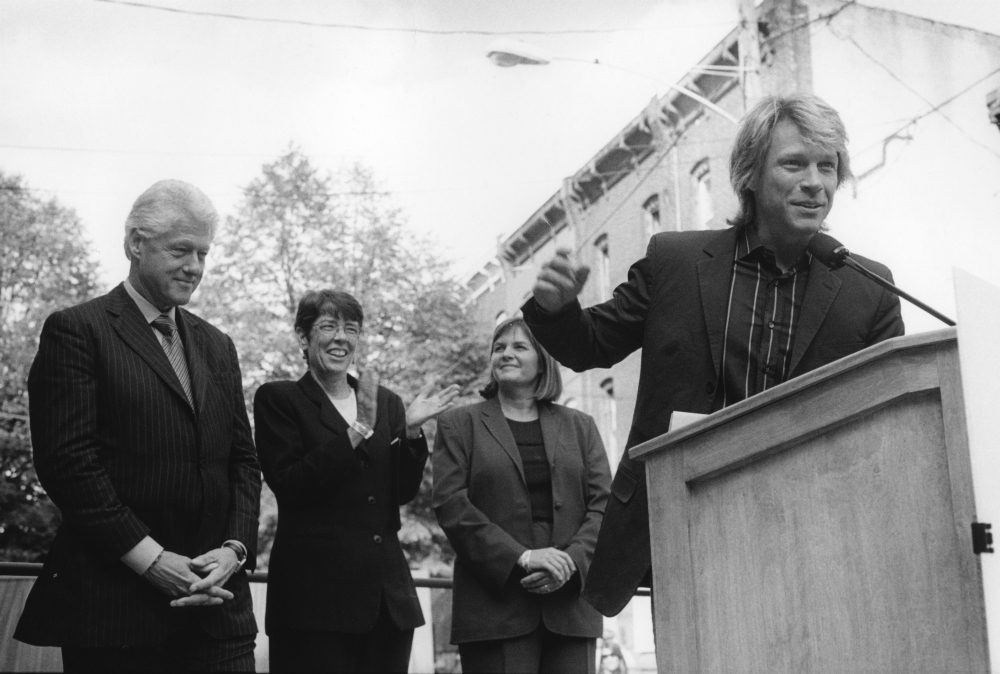
From left: President Bill Clinton, Mercy Sr. Mary Scullion, Joan Dawson McConnon, and Jon Bon Jovi at the 2006 dedication of a new Project HOME building in Philadelphia (Courtesy of Project HOME/Harvey Finkle)
Hanging on the wall of Scullion's Project HOME office is a large framed diploma in Latin: her honorary 2017 doctorate from Georgetown University. It is not her only honorary degree; in May, Scullion received an honorary doctorate from the University of Pennsylvania. Her work and role in the community also led Rep. Dwight Evans, D-Pennsylvania, to invite Scullion to President Donald Trump's 2020 State of the Union address.
When she won the Time magazine recognition in 2009, Scullion said at the time she was "profoundly grateful and moved by this honor."
"But the crucial message is the urgent need to respond to those men, women and children who are still on our streets and in our shelters," she added. "I urge all persons to get involved to advocate, donate and volunteer. Find an organization that does effective work in developing housing and services for people who are homeless and offer financial support as well as your time and talent."
The priority should be the people and the work that still needs to be done, she told GSR.
"People on the street are a prophetic presence, calling our society to a radical transformation of values and spirituality," she said. "Again, working with or just talking with people, being with people who were on the street, there's no pretense, no ... I don't know how to describe it except it's a very humbling, authentic experience."
This article was produced with the support of the USC Center for Religion and Civic Culture, the John Templeton Foundation and Templeton Religion Trust. Opinions expressed do not necessarily reflect the views of these organizations.
[Chris Herlinger is GSR New York and international correspondent. His email address is [email protected].]
Sisters in housing ministry around the world
When GSR developed A Place to Call Home, we knew our series would not be able to fully encompass sisters' work internationally. We wanted to include the efforts of as many sisters as possible who are addressing homelessness and/or affordable housing issues. So we created a questionnaire so you could tell us how you, your community, or sisters you know are giving others a place to call home.
So far, we have received more than 80 responses, which we used to create this interactive map showcasing sisters' work. Don't see your community here? Please add to our map, by filling out our questionnaire here.


